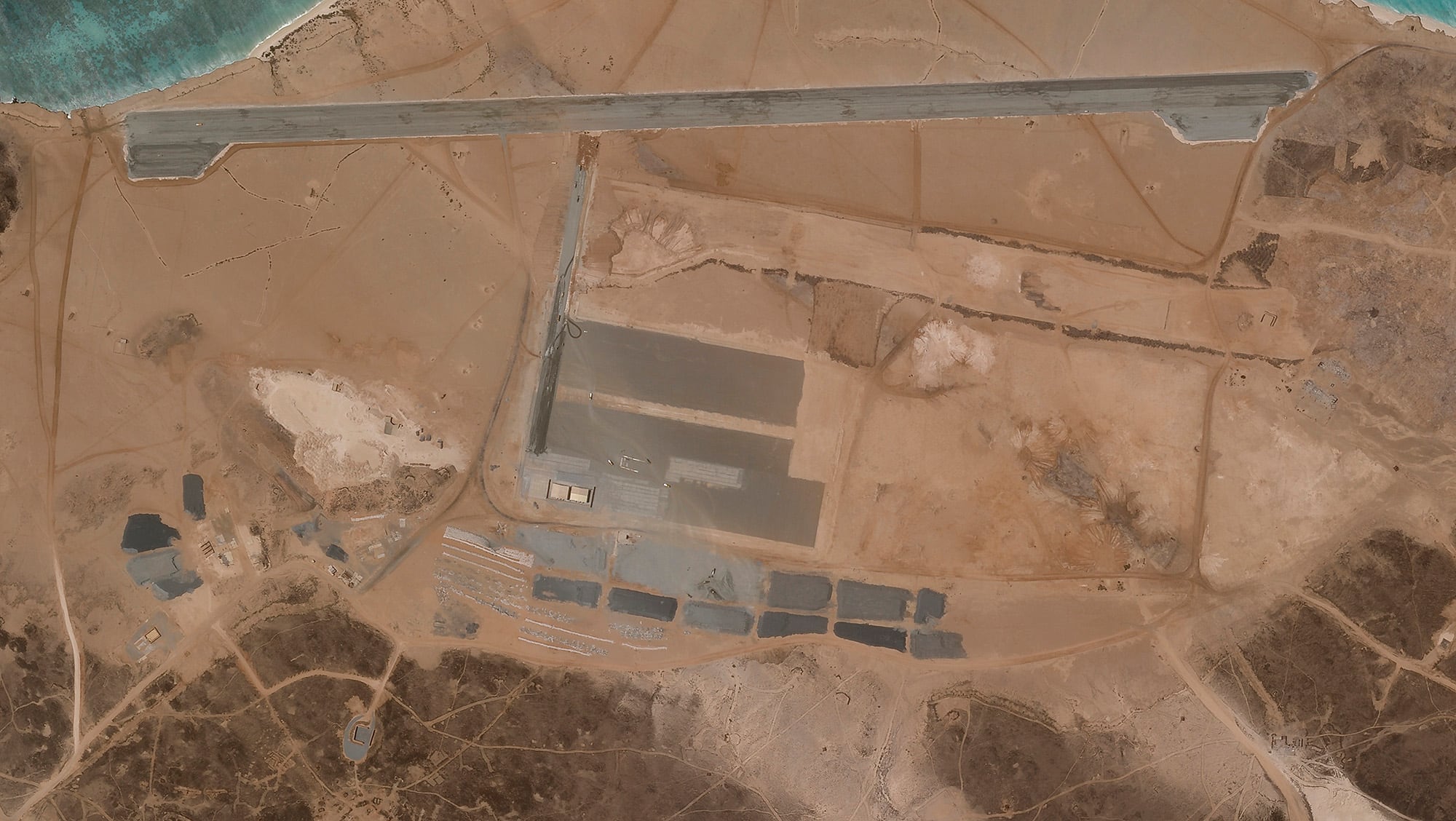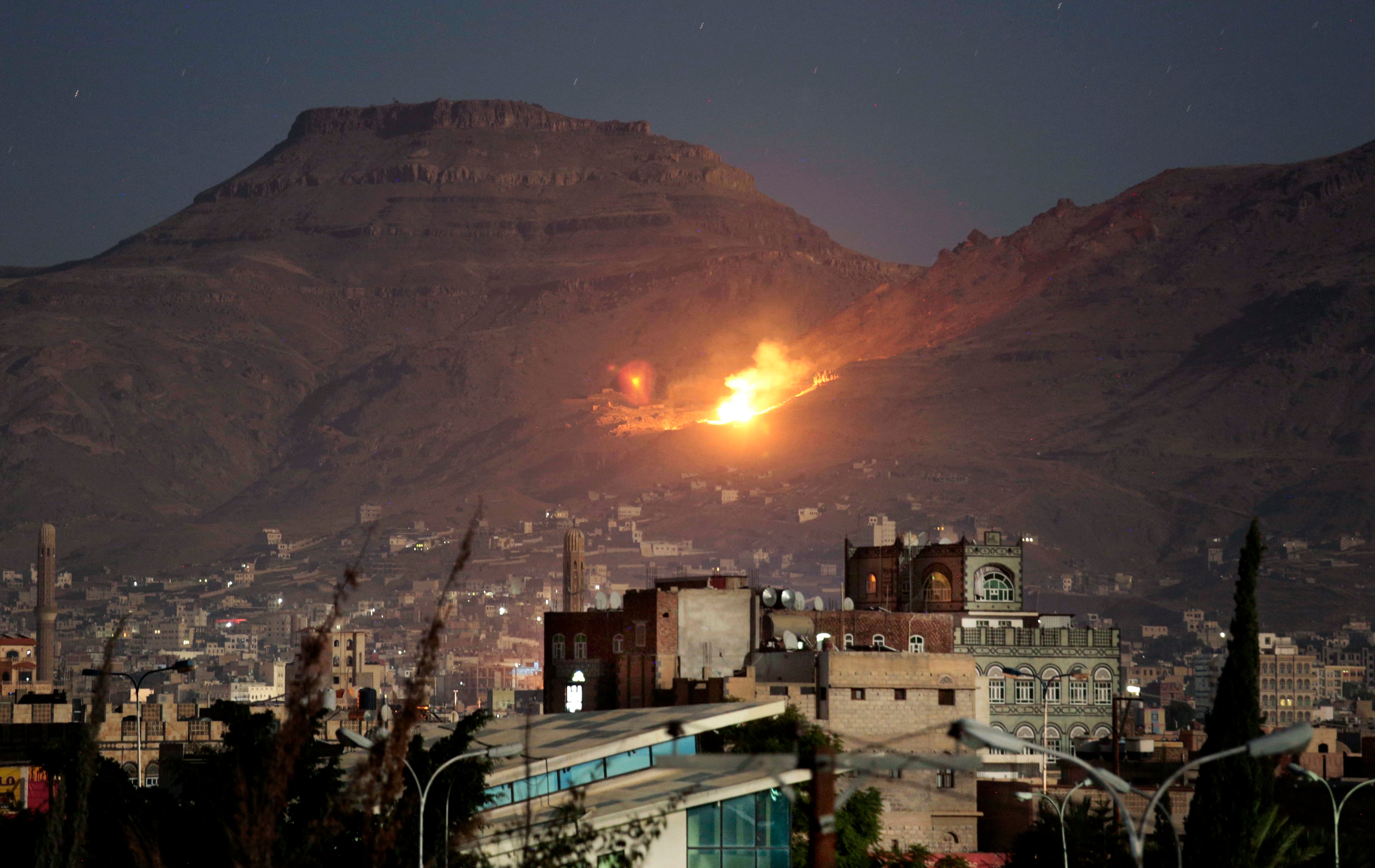DUBAI, United Arab Emirates — A mysterious air base is being built on a volcanic island off Yemen that sits in one of the world’s crucial maritime chokepoints for both energy shipments and commercial cargo.
While no country has claimed the Mayun Island air base in the Bab el-Mandeb Strait, shipping traffic associated with a prior attempt to build a massive runway across the 5.6-kilometer (3.5 mile)-long island years ago links back to the United Arab Emirates.
Officials in Yemen’s internationally recognized government now say the Emiratis are behind this latest effort as well, even though the UAE announced in 2019 it was withdrawing its troops from a Saudi-led military campaign battling Yemen’s Houthi rebels.
“This does seem to be a longer-term strategic aim to establish a relatively permanent presence,” said Jeremy Binnie, the Mideast editor at the open-source intelligence company Janes who has followed construction on Mayun for years. It’s “possibly not just about the Yemen war and you’ve got to see the shipping situation as fairly key there.”
Emirati officials in Abu Dhabi and the UAE’s Embassy in Washington did not respond to requests for comment. U.S. Sen. Chris Murphy, a Democrat from Connecticut, called the base “a reminder that the UAE is not actually out of Yemen.”
The runway on Mayun Island allows whoever controls it to project power into the strait and easily launch airstrikes into mainland Yemen, convulsed by a yearslong bloody war. It also provides a base for any operations into the Red Sea, the Gulf of Aden and nearby East Africa.
Satellite images from Planet Labs Inc. obtained by The Associated Press showed dump trucks and graders building a 1.85 kilometer (6,070-foot) runway on the island on April 11. By May 18, that work appeared complete, with three hangars constructed on a tarmac just south of the runway.
A runway of that length can accommodate attack, surveillance and transport aircraft. An earlier effort begun toward the end of 2016 and later abandoned had workers try to build an even-larger runway over 3 kilometers (9,800 feet) long, which would allow for the heaviest bombers.

Military officials with Yemen’s internationally recognized government, which the Saudi-led coalition has backed since 2015, say the UAE is building the runway. The officials, speaking to the AP on condition of anonymity as they didn’t have authorization to brief journalists, say Emirati ships transported military weapons, equipment and troops to Mayun Island in recent weeks.
The military officials said recent tension between the UAE and Yemeni President Abed Rabbo Mansour Hadi came in part from an Emirati demand for his government to sign a 20-year lease agreement for Mayun. Emirati officials have not acknowledged any disagreement.
The initial, failed construction project came after Emirati and allied forces retook the island from Iranian-backed Houthi militants in 2015. By late 2016, satellite images showed construction underway there.
Tugboats associated with Dubai-based Echo Cargo & Shipping LLC and landing craft and carriers from Abu Dhabi-based Bin Nawi Marine Services LLC helped bring equipment to the island in that first attempt, according to tracking signals recorded by data firm Refinitiv. Satellite photos at the time show they offloaded the gear and vehicles at a temporary beachside port.
Echo Cargo & Shipping declined to comment, while Bin Nawi Marine Services did not respond to a request for comment. Recent shipping data shows no recorded vessels around Mayun, suggesting whoever provided the sealift for the latest construction turned off their boats’ Automatic Identification System tracking devices to avoid being identified.
Construction initially stopped in 2017, likely when engineers realized they couldn’t dig through a portion of the volcanic island’s craggy features to incorporate the site of the island’s old runway. The building restarted in earnest on the new runway site around Feb. 22, satellite photos show, several weeks after President Joe Biden announced he would end U.S. support for the Saudi-led offensive against the Houthis.
The apparent decision by the Emiratis to resume building the air base comes after the UAE dismantled parts of a military base it ran in the East African nation of Eritrea as a staging ground for its Yemen campaign.
While the Horn of Africa “has become a dangerous place” for the Emiratis due to competitors and local war risks, Mayun has a small population and offers a valuable site for monitoring the Red Sea, said Eleonora Ardemagni, an analyst at the Italian Institute for International Political Studies. The region has seen a rise in attacks and incidents.
“The Emiratis have been shifting from a power-projection foreign policy to a power-protection foreign policy,” Ardemagni said. It increases “their capacity to monitor what happens and to prevent possible threats by non-state actors close to Iran.”
The expeditionary Quds Force of Iran’s paramilitary Revolutionary Guard was said to run a similar operation on a cargo ship long stationed nearby off Yemen before being apparently targeted by an Israeli attack.
Mayun, also known as Perim Island, sits some 3.5 kilometers (2 miles) off the southwestern edge of Yemen. World powers have recognized the island’s strategic location for hundreds of years, especially with the opening of the Suez Canal linking the Mediterranean and Red Seas.
RELATED

The British kept the island up until their departure from Yemen in 1967. The Soviet Union, allied with South Yemen’s Marxist government, upgraded Mayun’s naval facilities but used them “only infrequently,” according a 1981 CIA analysis. That’s likely due to needing to bring water and supplies onto the island. That will affect the new air base as well as Mayun has no modern port, said Binnie, the Janes analyst.
The base still may interest American forces, however. U.S. troops operated from Yemen’s al-Anad Air Base running a campaign of drone strikes targeting al-Qaida in the Arabian Peninsula until the Houthi advance forced them to withdraw in 2015. The Defense Department later acknowledged on-the-ground American troops supported the Saudi-led coalition around Mukalla in 2016. Special forces raids and drones also have targeted the country.
The U.S. military’s Central Command did not respond to a request for comment. The CIA declined to comment.
Associated Press writer Ahmed al-Haj in Sanaa, Yemen, contributed to this report.





